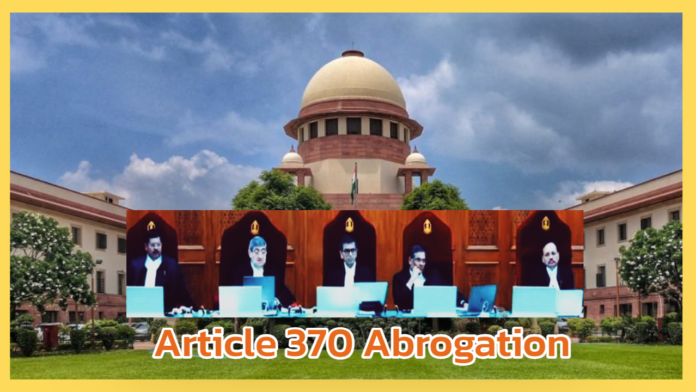The arguments put forth by the respondents were heard by the Constitution Bench, which was comprised of Chief Justice DY Chandrachud, Justices SK Kaul, Sanjiv Khanna, BR Gavai, and Surya Kant.
The AG’s initial line of defence was that the law does not require people to execute tasks they are unable to complete. In this regard, he asserted that, as a result of the Constituent Assembly’s dissolution, the President was no longer required to abide by its recommendation to repeal Article 370 pursuant to Article 370 (3). The AG argued that in this situation, the President had two options: first, he could exercise his authority under Article 370 (3) on his own without seeking any input from others; second, he could follow the examples set by earlier Presidents and turn to Article 367 and Article 370 (1) (d).
The AG claimed there was no “mathematical formula” to resolve problems involving internal unrest or outside assault. He suggested that there were some “broad standards” that should be followed in these circumstances to avoid violating core beliefs.
Senior Advocate Rakesh Dwivedi’s arguments were presented after those of Senior Adv. Salve. According to Dwivedi, it was the petitioners responsibility to demonstrate that the position they had taken was the only one that could possibly exist. If there were two points of view, he said, the viewpoint that supported the exercise of authority rather than undermining it should be adopted.
Additionally, he said that a suggestion made by a temporary body cannot ever be binding when it is presented to a permanent body by a superior authority. Dwivedi concluded by saying that the abrogation decision could not be made based simply on feelings. Senior attorney Harish Salve told the Supreme Court on Thursday that Article 370 was a “political compromise” reached at the time of Jammu and Kashmir’s accession and integration into India, considering the circumstances and the fact that there were several points of view on the matter.
A political settlement was reached. Even within the Congress Working Committee, there were significant divisions. They turned down this scheme. ‘Sorry, I don’t accept this,’ reads Sardar Vallabhbhai Patel’s letter. The United Nations loomed large in the background. There were conflicting points of view in this situation. Salve informed a five-judge Constitution bench chaired over by CJI D Y Chandrachud, which is hearing petitions challenging amendments made to Article 370, that this was the compromise that was inserted into the Constitution.
This was the “workable arrangement,” he said, addressing the bench. They agreed, saying that they would make the final decision and would reserve the right to disregard this article. But if each stage of this works, why not? And to a considerable extent, it was successful.
“There were two methods. One adage is irrelevant. The situation will calm down. Don’t consent to any preferential treatment for Kashmir. The opposing extreme advises accommodating a popular uprising if the legitimacy of the accession is being questioned. He noted, “This was the compromise.
Salve asserted that the historical context of Article 370 is crucial. While there was always optimism that relations with the neighbouring country would be cordial, the history of Kashmir did give rise to concerns. In light of all the sensitive issues involved, a border state was ultimately what persuaded the Constituent Assembly to approve the unusual arrangement. They added, “You have the ability to pull the plug,” with all of their knowledge. According to him, the best course of action for a court when it comes to constitutional interpretation of such clauses, which are fundamentally political, is to give them the broadest reading possible.
Senior attorney Rakesh Dwivedi testified on behalf of Ashwini Upadhyay and stated that the Article 370 question cannot be determined on the basis of sentiments. There are feelings on both sides. He asserted that it is the petitioners’ responsibility to provide evidence supporting their claims.






